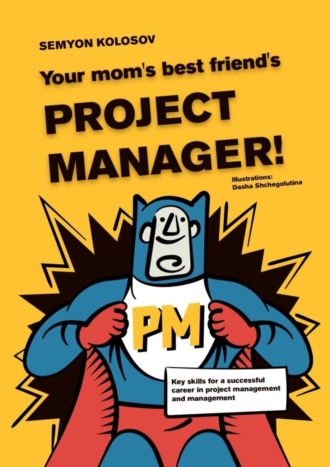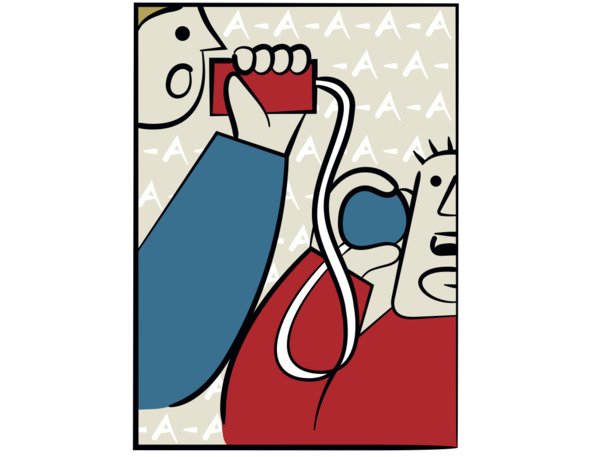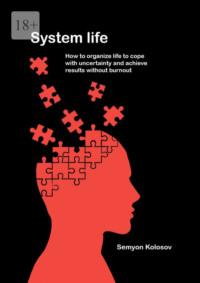
Полная версия
Your mom’s best friend’s project manager! Key skills for a successful career in project management and management
Doctor: I see, Mr. Gregory. Please continue.
Financial modeling
When it comes to launching or deciding to launch a project, the ideal PM uses financial tools and programs to create detailed financial models. At least on a napkin, at least in Google Sheets. He or she knows how to create budgets, analyze financial metrics, and forecast future revenues and expenses. A project financial model describes project parameters in money, allows you to interpret financial data and draw reasonable conclusions. The ideal PM always keeps the financial model up to date. At any given time, he or she knows what the projected profitability of the project will be and what will happen if a developer is suddenly removed from the project or a client takes several weeks to coordinate the color of a button with his wife. If due to the specifics of the project the financial model also becomes complex or individual calculations are needed, PM quickly finds a common language with financiers to make a tool convenient for all. Since the concepts of PL, CF, CM and COST for an ideal PM are not TikTok slang. We can say that a financial model for a PM is like a unit-economy for products. It gives you an understanding of the parameters at which the project will succeed, and at which parameters it is not even worth starting and you need to change the conditions. The financial model fixes the indicators at the beginning of the project, always shows the planned figures, the forecast of hitting the plan and the actual figures. The PM monitors deviations and makes decisions. The head of such a PM or CEO may not even communicate with him if he is sure that the financial model is up to date and the numbers do not give alarm bells. Financial modeling makes the ideal PM an entrepreneur in his project, and this is a completely different level of thinking and management.
Cash flow
Everything may be rosy on paper or in the tables, but if you don’t get the planned cash (CF), you may have a cash gap. Cash flow is live money that falls into the company’s account. It is used to pay salaries and buy coffee for the office. Every month, regardless of how things are going in the project. When there is no money in the account, but there are expenses, it is unpleasant. It’s good if the lost money covers the income from other projects. But this is not always the case. That’s why the ideal PM ensures that the money is received in a timely manner. From the very beginning, from getting to know the client to receiving payments, he or she builds agreements and controls the process to make sure everything is on time. Believe me, as soon as a scheduled money arrival appears in the financial model, the finance people read it as “PM [Name] has signed in blood that amount N will be on X number. Nothing can prevent that, and if it does, the PM will kick that money out and we are 100% counting on it.” They’ll never say that, but that’s what they think. For the ideal PM, getting paid is a separate sub-project. From the beginning, he studies the payment process at the client’s company, outlines it and coordinates it. He knows the timings and everyone involved so he can monitor and very specifically ping who needs to be pinged. When necessary, he can even go into “cute collector” mode or escalate when nothing else is working.
Session 6. Communication

I don’t think I need to explain that effective communication is the foundation of successful project work. Communication affects every aspect of a project manager’s work. Without effective communication, interactions with stakeholders become unpredictable and risky. The ideal PM has an exorbitant level of verbal and written communication. For him, it is not the transfer of information. It is the art of reading between the lines, listening and hearing, persuading, motivating, building trust, resolving conflicts and more. Strong communication skills can compensate for errors and mistakes in projects and break down very complex problems. The ideal PM is a true connoisseur of digital etiquette, handles all communication responsibly and cares about the consumer of information. This is a very rare skill and I value it very much in project managers. I cannot describe all the applications of communication, but I will go over the most important components of an ideal PM.
Flexibility and empathy
Ford President Lee Iacocca said, “There is one phrase in the characterization of any manager, no matter how capable, that I do not tolerate; this is it: “He doesn’t get along with people.” I think that’s a killer characterization.” Totally supportive. Unless the other side is a complete asshole who deliberately wants to hurt you, you can always negotiate. Unfortunately, people often label people without even trying to understand the person. Being flexible doesn’t mean bending to someone else’s interests, but tuning in to the same wavelength with the person to find common ground. Understand the overall context and emotional response, notice the true motive or issues that the person doesn’t talk about but they influence their decision. The ideal PM always shows empathy. He understands and empathizes with the feelings and thoughts of others. Engages in the emotional experience of others and is able to perceive their world from their perspective. Therefore, he is open to discussing opinions different from his own and is willing to change his point of view when influenced by reasonable arguments. He does not communicate with clients and the team as “one of many’”, but as a specific individual. Attentively and openly, so that there is an atmosphere of mutual understanding. This approach helps to conduct constructive dialogue, resolve conflicts and build communication on the basis of mutual respect and trust. Because any mistrust is a virus for the team and the project.
Influence and persuasion
By influence I do not mean any manipulation or coercion. Influence comes organically from the ability to persuade. That is, how to build storytelling and argumentation to convincingly present ideas, motivate the team and overcome resistance to change. Without pressure or damaged relationships. The ideal PM builds a logical line of argument with transparent cause and effect relationships so that people quickly get the big picture and resistance is reduced. He knows all about cognitive distortions and traps. So he builds arguments that protect people from erroneous judgments. You bet, because he has books by Chaldini and Kahneman on his shelf. I won’t repeat myself about the effectiveness of communication. I’ll just say that this skill helps get agreement and support for important decisions faster. There are situations when it is very important. And the ability to insist on your decision saves a project from failure. A special place in the heart of an ideal PM heart is the application of this skill in negotiations and defense of their decisions in front of stakeholders. Because clients often give money to professionals to do the right thing. But when they do, the client abruptly realizes that they know the right thing to do, even though they are not professionals. So you have to convince people that there are many options, but common sense is the only one.
Ability to explain and concise
If I were as concise as the perfect PM, we’d get through this faster. But for now, listen up. Especially since I think you benefit from people who aren’t brief. You’re paid by the hour, aren’t you, Dr. Milestone? Just kidding.) Agreed, a clear and concise explanation allows you to convey information effectively and minimize the possibility of misunderstandings. Brevity, on the other hand, allows you to emphasize the main point, focus on the essence and avoid information overload. The ideal PM is able to condense complex concepts and key messages into clear and concise statements. He builds logical and consistent explanations, uses simple and clear language, adapts to the interlocutor and gives out only the necessary information. In any way that is convenient for everyone. From drawings on the blackboard to facial expressions. In short, he does not pour water and always speaks to the point, which allows you to focus on the main objectives and the result. This greatly improves the quality of communication and saves time and attention.
Conflict resolution
Conflicts of interest or resources are understandable. But conflicts between people are a complicated story, because people are involved. Conflicts can arise because of differences in views, interests and personalities, and they cannot be completely avoided. There may be a perfect culture and a rosy atmosphere, but sooner or later irrationality and emotions will make themselves known. An art director may express dissatisfaction with a designer, an analyst will be upset that they laughed at his toy on the table, and someone will harbor a grudge for an unfounded claim. Open or hidden conflict, it doesn’t matter. It will affect the job. The ideal PM makes sure it doesn’t come into conflict. But if a conflict has happened, the PM will not stand by. He will always try to move the conflict in a constructive direction. To turn on the maximum ability to listen and understand the parties, to search for compromises, to find mutually beneficial solutions and to apply approaches to conflict resolution. He will always be a neutral mediator, able to overcome emotional obstacles and find constructive solutions. Especially in group discussions. The ideal PM is the perfect facilitator. He plans and structures meetings, uses tools to stimulate discussion, exchange ideas and joint decision-making, and manages time and ensures that all team members participate. And all this in a trusting and supportive atmosphere. By the way, working with conflicts is not just about rushing in a second before a fight and settling it all. It is about preventing conflicts and building a culture of constructive conflict. After all, Patrick Lencioni said that “any long-term relationship requires constructive conflict for its development. This applies to marriage, partnership, friendship and, of course, business”.
Public communication
The ideal PM uses all of the above confidently not only at home in front of the mirror, but also in public speeches, presentations and any group communications. It is not a problem for him to speak clearly and convincingly in front of an audience, present a project or defend the team’s solution to a client. He plans and prepares for speeches in detail, but if it is necessary to improvise, he will be an interesting and charismatic speaker who holds the audience’s attention and inspires confidence. He skillfully uses storytelling and presentation techniques to achieve his goals. The shorter the speech and presentation, the more time is spent on preparation. A perfect PM presentation always wins over the listener’s desire to get stuck on the phone. This strengthens his reputation and attitude towards the company, and if used correctly, it also pumps up the HR brand.
Caring for the information consumer
I’ve said before that the ideal PM is a true connoisseur of digital etiquette. He is not just an embodiment of it, he is a product owner of information: in a letter, in a message, in spreadsheets, documents, comments, etc. In any communication channel, he thinks about the user and delivers value to him. It takes care of his eyes and brains. There is never any question about the layout and formatting of the texts of an ideal PM. Consumers of his information need to do minimum actions to respond, understand or use the information. Since he always takes care of its appearance, structure, hierarchy, readability and further usage scenarios. In short, an ideal PM always has everything clear, structured and understandable. Such digital care creates a good impression, increases the coolness and brand of systematicity. Because it saves other people’s time, which is invaluable.
Session 7. Sales, business and clients

It would seem that why would an ideal PM need sales? There is a sales department and account managers who sell, hand over the project to the PM, and he realizes it. But if a project manager knows how to sell, everyone benefits. First, he closes a bigger block of work, as a sales person is not needed. Secondly, there is no process of transfer from sales to production, because who sold, he does. Third, if you start with sales, it’s a whole different level of awareness and approach. The ideal PM doesn’t show a price list to the client to choose a service and have the team do the technical requirements. He or she works with the client’s goal-setting and scrupulously searches for the answer to the question, “Why does the client need the project?” It often happens that it is necessary to do something quite different from what was voiced in the request. In this way, a relationship with the client is formed from the very beginning and expertise is demonstrated. Since a project manager knows better than any salesman how projects are done and what risks there are. And expertise sells very well. An ideal PM doesn’t sell anything, he tries to help and find a solution. When the project is realized, the relationship with the client develops, and the project manager becomes more and more deeply immersed in the client’s business. This allows for pre-sales. When the project involves doing the right thing and not doing the right thing, you will inevitably have to figure out the client’s business and motivations. These skills, along with communication, make the perfect PM the perfect salesperson.
Understanding the client’s business
The ideal PM may not understand all businesses and have all industry expertise. But he knows how to immerse himself in the business so that he has a sufficient understanding of how the business works and how it makes money. Before the first meeting, he gathers information about the client: he studies the field, the market, competitors, trends, etc. If possible, he finds all the client’s statements in the public domain to understand the company’s development vector. Then it understands the client’s current situation, its place in the market, maturity, strengths and weaknesses. And the coolest part is that the ideal PM has an understanding of the client’s value delivery chain. Not to the client, but from the client to their customers. Projects and products are not made for the client, but for his clients own customers. He understands the client’s business model. How value is produced and how it is delivered to the customer. Therefore, the ideal PM in the first meeting can talk about the client and not about himself or his product. And this is the ultimate in building trust and first impression. When the client says, “I don’t understand anything about this, you’re the expert, do it right” – and when the team does it right, but the client disagrees, the ideal PM can argue all decisions in the language of business.
Positioning and portfolio knowledge
Ask your project managers, sales people, or any employee, “What do we sell?” In most cases, you’ll hear a list of services: design, development, etc. This is equivalent to saying that a restaurant sells food. A vegetable garden and a grocery store sell food, too. It’s cheaper too. Why do we go to restaurants? The ideal PM doesn’t just freely broadcast the company’s position in the market and appeal to services, portfolio cases in relevant situations. He explains the value of services to all levels on the customer side. He explains how the service will help the project holder to get a promotion, their manager to show the right result, and their company to achieve the goal. He makes the case for why your company is the one that knows what to do and how to do it. And masterfully pulls relevant services out of his sleeve as the conversation progresses, explaining when they are most needed. Explains in the language of the client how to evaluate results and select contractors, and if he realizes that the client’s need is beyond the company’s expertise, he figures out a way to close the need by collaborating with someone or contracting out. After talking about services with the ideal PM, the client always learns something new and is convinced that no one else will do it better. While others list a list of services and don’t respond to emails for two days, the ideal PM closes deals.
Конец ознакомительного фрагмента.
Текст предоставлен ООО «Литрес».
Прочитайте эту книгу целиком, купив полную легальную версию на Литрес.
Безопасно оплатить книгу можно банковской картой Visa, MasterCard, Maestro, со счета мобильного телефона, с платежного терминала, в салоне МТС или Связной, через PayPal, WebMoney, Яндекс.Деньги, QIWI Кошелек, бонусными картами или другим удобным Вам способом.


